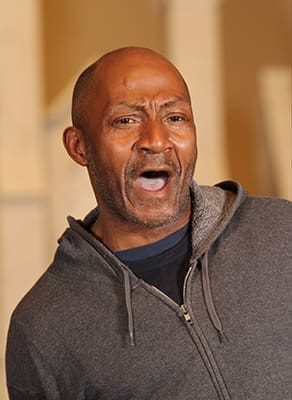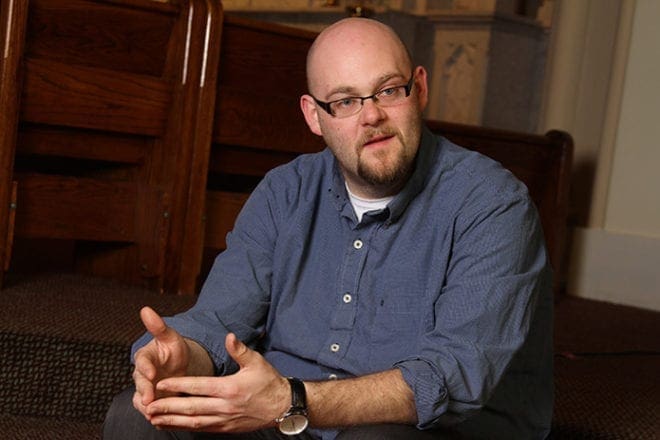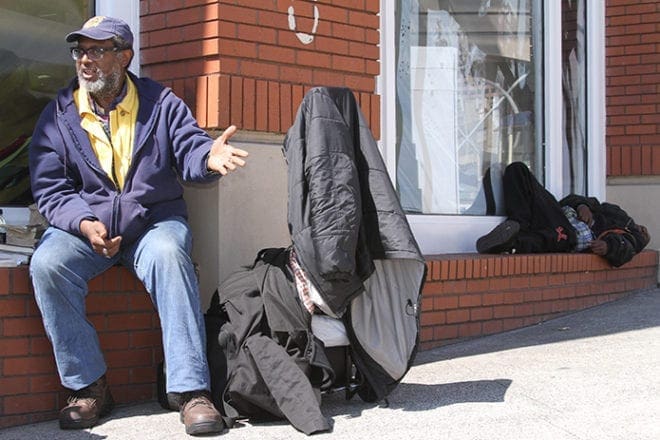Atlanta
Shrine’s enduring outreach embodied in Homeward Men’s Choir
By ANDREW NELSON, Staff Writer | Published March 20, 2014
ATLANTA—The Homeward Men’s Choir was greeted with a standing ovation after entertaining some 200 people. The robust and raw voices blended to fill the barrel ceiling sanctuary of the Shrine of the Immaculate Conception. Spirituals and Broadway hits sung by this choir of seven, wearing lilac shirts and black pants, got people out of their seats, swaying and clapping.

Pittsburgh native Tyran Austin sings a solo as the choir performs their rendition of “I’m So Glad.” Photo By Michael Alexander
After the hour and a half show, while the crowd was still leaving, the choir members changed out of their shirts and pulled their wheeled bags up Martin Luther King Jr. Drive to claim their beds for the night at the Central Night Shelter.
Grantred Mullins sang in a choir a “long, long, long, long time ago.” His last job in construction was a few years back. The soft-spoken Mullins, 44, is also an artist, painting in oils and acrylics with a few shows displaying his work.
“I still have the voice,” said Mullins, a soloist at the performance.
Community celebrates its best-known pastor
The parish on Sunday, March 16, hosted the “Fire & Faith” concert. Its music ministry, jazz vocalist Kathleen Bertrand and pianist Kenny Banks, along with Dante Hawthorne on saxophone, also performed.
It was part of the community’s celebration of its best-known pastor, Father Thomas O’Reilly, an Irishman who is credited with having a role in stopping the burning of civic buildings and downtown Atlanta churches in 1864. This year marks the 150th anniversary of the Union Army’s victory at the Battle of Atlanta. Days earlier, the parish opened its doors for tours of its crypt, where Father O’Reilly is buried, and hosted a Mass to commemorate Father O’Reilly. Dignitaries and civic leaders put a wreath at his memorial at Atlanta City Hall across the street.
Father Patrick McDevitt, the president of All Hallows College, in Dublin, Ireland, where Father O’Reilly attended seminary, came to the concert.
“We continue to educate people in the same values that were taught to Father Tom O’Reilly,” he said. “We’re very proud of him. He is an example to us. We lift him up to our students to say, here’s another hero.”
Mirroring Father O’Reilly’s outreach to both the blue and the gray during the Civil War, the Shrine of the Immaculate Conception continues that outreach by serving people living on the streets. On weekday mornings, folks can pick up a sandwich and a snack, washed down with hot coffee. The St. Francis Table opens on Saturdays, serving meals. The parish hall during the cold months is part of the night shelter, a joint ministry with its next-door neighbor, Central Presbyterian Church.
The Homeward Men’s Choir is a singing group recruited from men who sleep at the Central Night Shelter in the winter. It closes at the end of the month, when men must find other places to stay. They sang live on TV, performed at Atlanta City Hall, and had a Christmas concert. A few members of the choir have found jobs or returned to school. Interviews with the choir, attending their rehearsals, visiting with a member where he studies while buses and cars rumble by on a busy city street, revealed a choir of perseverance and hope.
Seeing men waiting spurred music director
As a newcomer to Atlanta, Dónal Noonan got the idea for the choir on his commute. On his drive to the Shrine parish he’d see men around the Georgia Statehouse who seemed to be waiting for something—or someone—who never showed up. That was six months ago.
“I decided to use my God-given gifts to form a choir. It began,” said the Irish native. The 32-year-old has been a church musician for more than a dozen years, moving from the Emerald Isle to Florida, then to Atlanta. He oversees four Shrine choirs, including a bell choir and schola.

Shrine of the Immaculate Conception director of music Dónal Noonan is founder of the Atlanta Homeward Choir, a vocal ensemble of Atlanta area homeless men. Photo By Michael Alexander
He recruited singers in the fall by approaching the men as they entered the shelter.
“I asked every single one of them as they came in. Some of them were skeptical. I went back three or four nights,” he said.
The choir members chose the name. The members didn’t want to be labeled as homeless, so they chose a name that spoke of their desire. They wanted to be seen as people on their way to a home, a life off the streets and out of the shadows.
The men gathered on Tuesdays and Thursdays to rehearse. Their possessions came with them: the overstuffed roller bags, a blue Ikea shopping bag filled with newspapers and books. After the hour practice, the men made their way to the shelter.
Choir leads to schooling
Edward McIver’s bass voice was featured in a solo in “Fix Me, Jesus,” a song of pleading that conveys a statement of faith and trust.
Days earlier, McIver settled on a sun-kissed spot near Underground Atlanta. This ledge, with its beautiful view of the golden dome of the Statehouse and flowering trees, is where he can read for his classes at Atlanta Technical College.
He grew up in southwest Atlanta. His father was a Baptist minister and his mother worked in school cafeterias. A proud man, he has not turned to his siblings or his children for help.
He said he is on the street because unemployment checks ended. And he cannot find new work because of his eyes, as he deals with cataracts and glaucoma. He said he recently spent a day waiting at Grady Medical Center emergency room just to see an eye doctor. He cannot read the walk signs at intersections with his impaired vision, so he believes no employer would risk hiring him.
“You are just one illness from being homeless,” he said.
The 51-year-old is working toward his certificate at the vocational college in health care sciences. His eventual goal is to be a registered nurse. He said he’s had various jobs, from his own video production company and selling ads on the radio to driving cars at an auction house. This has been his first winter homeless, he said.
The choir has helped him. It introduced him to the St. Vincent de Paul ministry at the parish. Members replaced his glasses held together with tape and got him outfitted with a correct vision prescription. The ministry also provided him money to ride MARTA to school before his state and federal education financial aid arrived.
He sang as a kid, but his reason for being part of the choir is very practical. The men sign into the shelter first, get a bed first, and, when they’ve stood on their feet all day, an opportunity to skip waiting in a line is welcomed.
He’s learned a few things about living on the streets since last summer.
“Don’t just turn up your nose and run away” from people who are homeless, he said. “The people who are homeless today may not be homeless tomorrow and the people who aren’t homeless today may be homeless tomorrow.”
The shelter closes at the end of the month. He does not know where he will live yet. There are a few leads.
“It’s been fun. I didn’t look at it as a steppingstone. I enjoy singing, so it’s been fun,” he said of the choir.
Unexpected encounters
Damian W., who asked that his last name not be used, grew up in Atlanta. He said he attended St. Anthony of Padua Church and graduated with the Class of 1967 from the now closed St. Joseph High School. He attends Mass on occasion, sometimes at the Catholic Center at Georgia State University, or at the Basilica of the Sacred Heart or at the Shrine.
He said “a series of hard knocks” put him on the street. He lost income from his travel business, he said. People interested in vacations turned to the Internet to book cruises online instead of through travel agents, he said.
“The Internet has sort of gutted that business. I find myself with no income,” said the 64-year-old. Damian said he’s been on the streets for four years. When the shelter closes in April, he hasn’t made plans yet.
“Whatever works,” he said. “I’ve slept on sidewalks. I’ve slept in bushes.”

Ed McIver, left, has been on the street since the summer of 2013. He is currently a student at Atlanta Technical College working on a degree in health care sciences. McIver, 51, has aspirations of becoming a registered nurse. In addition to being homeless, he also struggles with cataracts and glaucoma. Photo By Michael Alexander
Since turning 62, Damian has used a state law that allows him to attend college classes for free. Damian spends time at Georgia State, auditing classes. Right now, he sits in on instructional technology classes. He said he earned a bachelor’s and a graduate degree from the university years ago.
He stepped forward to join the choir even though he hadn’t sung since high school. Damian said he’ll keep doing it “until they get someone in my slot.”
It’s made him a face that people respond to and he gets greetings from folks he didn’t know.
“You get unexpected recognition from the shelter volunteers,” he said. “You get stopped by people on the street, who say, I saw you on TV.”
‘A testament to the power of music’
From these untrained voices, a new community at the Shrine of the Immaculate Conception has started.
“To see community form is what we are about as church and to see that happen and to see that manifest in front of you, to go from a group of strangers who don’t know each other to have allies in the field, and the field, of course, is the streets of Atlanta. Now the guys look out for each other,” said Noonan.
“They’re really into it, which is a testament to the power of music. It can bring people together in different walks of life, it transcends all sorts of crazy socioeconomic circumstances,” Noonan said.